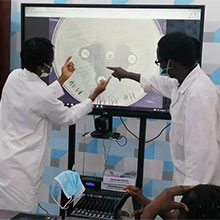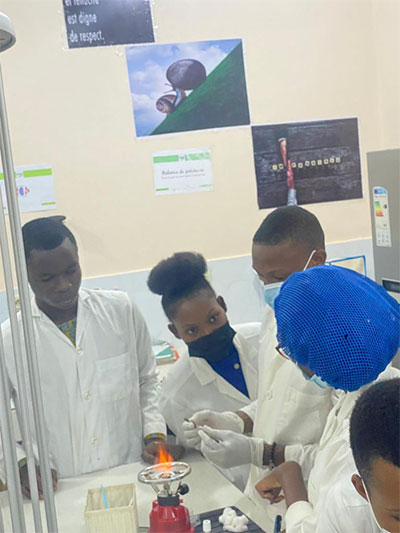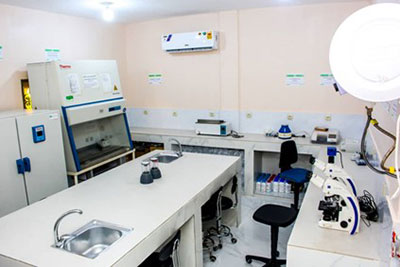The sorcerer of the invisible, the friend of microbes: the microbiologist in Benin, a road made of passion and sacrifices
17 May 2022

I often tell my collaborators, students and colleagues that I am a sorcerer. I have hammered it in so much that many now call me this systematically. Yes, I have been conquered by the world of microbiology. In my country, Benin, there are specialists of the invisible who are called sorcerers. Public opinion sometimes attributes supernatural powers to them, and they have a rather negative connotation. But that’s not why I like to be called a sorcerer. It is a microbiologist’s ability to question living beings invisible to the naked eye that pushed me to make this comparison.
I am a pure product of polytechnics. I did all my studies at the Ecole Polytechnique d’Abomey-Calavi (EPAC), Benin, where I had teachers who gave me a very solid foundation in biology. Of all the subjects taught from the first to the fifth year of my training, I had a particular interest in microbiology, a science that is easily combined with many other disciplines in biology, such as immunology, biochemistry, haematology, etc. This passion was born during my first steps into university and was maintained by my personal culture. I wished to mark my existence by my devotion to science and to advancing knowledge in this discipline.
Convinced that microbiology can indeed be a foundation for development in this country, I have always been able to transmit my passion for research to my students and collaborators. Being a lecturer in Benin means first of all being willing to sacrifice one’s personal life for the benefit of students’ training. From the beginning of my career, I have had to face many challenges but, with a dedicated team and visionary colleagues, I have been able to provide appropriate answers.

Challenge one: the issue of training
As a lecturer in the Department of Human Biology Engineering, I can say that our training attracts many students. However, we do not have what it takes to cope with the challenges of time. Initially, our school was provided with funding from Canada for the building and initial equipment for the laboratory 40 years ago. Over time, the number of students increased tenfold. I currently teach microbiology to nearly 100 students in the third year of their bachelor’s degrees. This is a very high number as regional guidelines suggest a maximum of 25 students per classroom. The laboratory has not changed, and some of the equipment is older than me, for example my incubator in the laboratory is now almost 40 years old. Huge sacrifices must therefore be made by forming pedagogical groups of students and, therefore, repeating the manipulations as many times as possible. To respond to this paradigm, with a group of teachers, we took advantage of the COVID-19 crisis to encourage e-learning. So, to promote microbiology among undergraduate students, I produced an e-learning tool available online and an app for Android phones and tablets.
In order to give young students the chance to acquire Master’s level qualifications comparable to what is done in Northern countries, I have initiated the establishment of an MSc program in Molecular and Medical Microbiology. This program was set up to prepare some well-trained specialists in microbiology. Those specialists were very useful in Benin during the Lassa fever pandemic and the recent COVID-19 outbreak. We offer these students a specialised theoretical and practical program on specific biological concepts.
Challenge two: infrastructure and equipment
Living my passion as a microbiologist required me to be surrounded by hard-working and dynamic colleagues. To date, we have been able to meet the challenge of being a developing country. Through collective efforts, we have set up a large multidisciplinary research laboratory with state-of-the-art equipment and technology to address development issues, such as health and environmental problems in Africa and worldwide, in the biological sectors.

Each day comes with its own set of realities, but I remain convinced that I must do better than the day before to offer new opportunities to the thousands of students we train: to live from research. This implies being a living example of self-sacrifice, work well done, rigour, scientific culture and fulfilment as a researcher. This is my vision, my struggle and one of my primary reasons for living.
Overall, my research contributes directly to the achievement of the United Nations’ Sustainable Development Goal 3 (Access to health), 4 (Access to quality education) and 6 (Access to safe water and sanitation). As a Young Affiliate of the World Academy of Sciences (TWAS) in 2016, I have collaborated with 150 researchers from over 80 research institutes around the world to date. I am the current Head of the Research Unit in Applied Microbiology and Pharmacology of Natural Substances, Applied Biology Research Laboratory, Polytechnic School of Abomey-Calavi, University of Abomey-Calavi.
Each year, more than 150 young researchers are impacted by the activities of this laboratory. My academic career has been regularly enriched by participating in international workshops and symposia, visiting partner laboratories abroad as well as completing training funded by various international scientific institutions. From 2015 to date, I have won 15 competitive research projects as a principal investigator or local coordinator, one as a collaborator and more than 35 travel awards. My research outputs include the work of six PhD students and 25 master’s students, 138 peer-reviewed journal articles including 40 in A-ranked journals, and 75 conference abstracts. One of my research projects has led to the production of 03 phytomedicines called SALM-MTA against salmonellosis. In 2020, with my team, I produced a biopesticide against mosquito larvae based on Bacillus thuringiensis. These innovations have allowed me to be invited by many television stations in Benin and have received special recognition from the Rector of the University of Abomey-Calavi. One of my multiple collaborations led to the discovery and sequencing of lytic bacteriophages infecting Acinetobacter baumannii from Beninese wastewaters.
In light of my ongoing contributions to research, capacity building and sustainable solutions, the American Society for Microbiology (ASM) selected me as a Young Science Ambassador for 3 years from 2016 before promoting me to National Ambassador in 2019. After a global selection, I was also recruited as a member of the prestigious Global Young Academy (GYA) in 2019 and then as a Champion of the Microbiology Society. I have led and contributed to the training of many science researchers. During the COVID crisis in Benin, my team contributed to the fight against the escalating price of hydroalcoholic products by producing them locally at lower prices. I advocate for causes of interest in Africa, as was the case with the COVID-19 memorandum and the fight against predatory journals in developing countries where I play a key role.

Victorien Dougnon
Senior Lecturer at the Polytechnic School of Abomey-Calavi, University of Abomey-Calavi, Benin 01 PO BOX 2009 Cotonou, Benin
[email protected]
[email protected]
researchgate.net/profile/Victorien_Dougnon
Through his work, Victorien is involved in the fight against antimicrobial resistance in Africa. As a scientist, his interests are linked to molecular microbiology, hygiene and public health, with a particular passion for the use of medicinal plants against infectious diseases.
What advice would you give to someone entering this field?
I would advise them to be passionate. Passion is the key word to go through all the difficulties. This world of microbes is marvellous if you are ready for it. You also need to have a great sense of rigour and commitment. Once you get that, the world is yours.
Why does microbiology matter?
Our world as humans is in constant relationship with micro-organisms. How can we live with them if we don’t rely on strong science to support? That is why microbiology matters. Because we need to save lives. Because we need to promote biotechnology using the benefits of microbes. Because microbes are our friends and the small part that is harmful is well known by this science.
